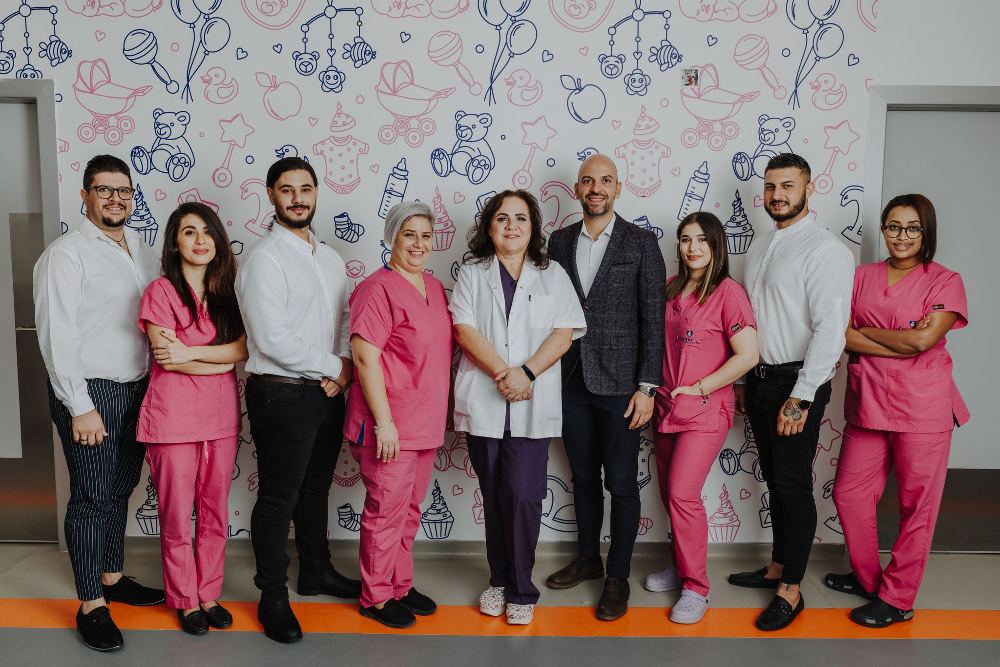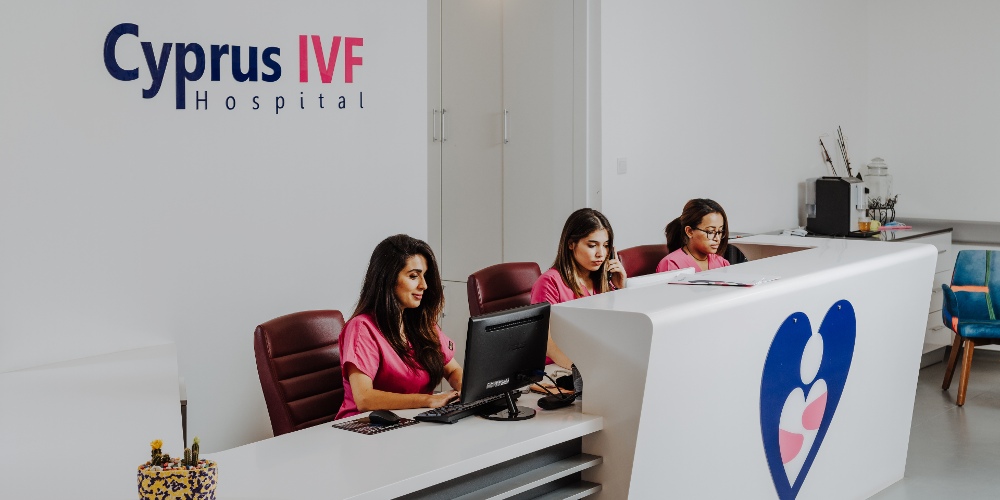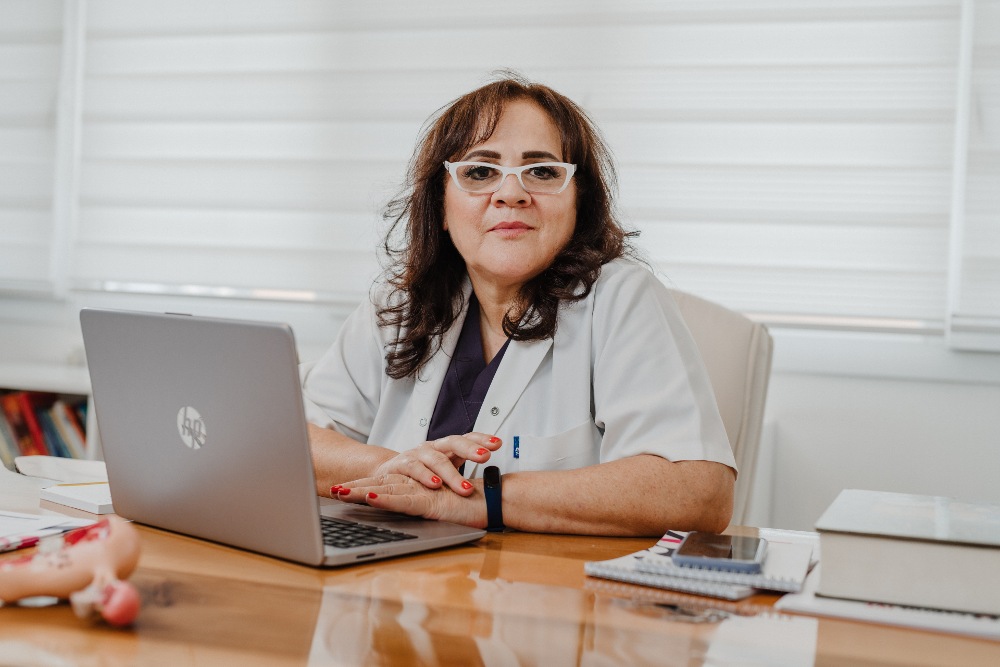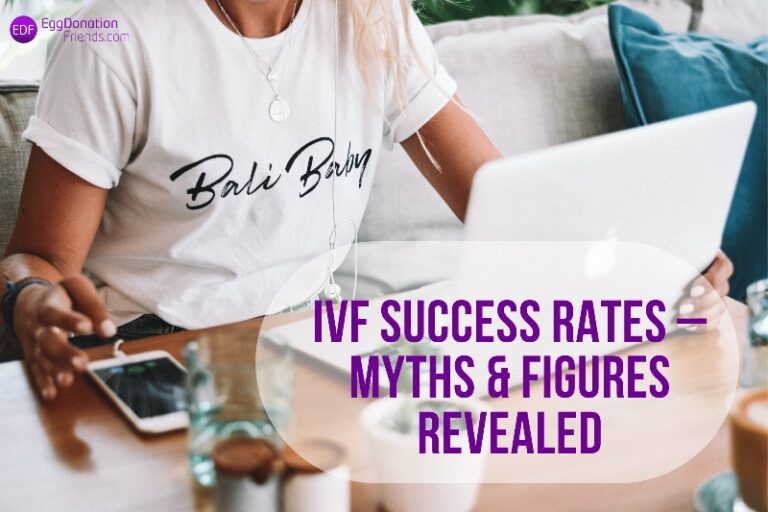Egg Donation Treatment at Cyprus IVF Hospital
Embarking on the fertility journey takes a personalized and knowledgeable touch. Join us in an interview with Dr. Serap Kağan, the Medical Director of Cyprus IVF Hospital. With over 15 years of expertise in IVF and 35 years of expertise in gynecology, Dr. Kağan shares insights into the unique aspects of IVF treatment, the intricacies of egg donation, and the compassionate care that sets Cyprus IVF Hospital apart. We have asked Dr. Serap Kağan questions about North Cyprus as an IVF destination, egg donor availability at the clinic, fresh and frozen IVF cycles, the process of donor egg cycle, IVF add-ons, etc.
Interview with Dr. Serap Kağan
Can you tell us why patients from abroad should consider North Cyprus as their destination for egg donation programs abroad?
Northern Cyprus is visited by many international patients searching for high-quality IVF treatment. It is well known for affordable treatment fees, high-standard healthcare facilities, liberal IVF regulations (women up to 55 and same-sex female couples are welcome), various donation programs, and premium packages, including premium add-on services designed for our patient’s needs.
Why choose Cyprus IVF Hospital? We have no waiting time for donor selection, a diverse egg donor network, and the flexibility for women to undergo IVF treatment up to age 55, the clinic caters to the unique needs of unmarried couples and single women. We offer personalized care that aligns with individual preferences, high success rates, a multilingual and experienced medical team, and access to high-standard healthcare facilities. We also offer a Pregnancy Guarantee Program.
What egg donors are available at Cyprus IVF Hospital (race/ethnicity, proven fertility, age)?
All our donors are anonymous and aged between 21-31. Fertility and other tests are applied to donors. The donor ethnicities are mostly Caucasian (such as Ukrainian, Moldovan, Belarussian, Russian, and Turkish), Asian (not the Far East but Central Asia like Turkmenistan, Uzbekistan, and Kazakhstan), Middle Eastern (various Arab ethnicities and Iranian), Black African, and North African (such as Moroccan).
Do you use your own egg bank or external egg banks?
We don’t use external egg banks. Our hospital maintains an in-house egg donor database, providing a comprehensive selection of available donors.
How egg donors are qualified for the process?
How do we select our egg donors? All our donors are anonymous, aged between 21-31, possess perfect health and mental state, undergo screening for medical, genetic, and psychological factors to ensure the absence of transmissible or genetically determined diseases and maintain a healthy lifestyle (BMI below 30).
Which criteria do egg donors have to meet?
In addition to the above-mentioned requirements, donor candidates must pass all required blood tests, ultrasound scans, gynaecological examinations, and genetic testing to ensure they have sufficient ovarian reserves and are free of infectious and most frequent genetic diseases. This comprehensive selection process generally takes a couple of months.
The required tests, determined by the Ministry of Health in North Cyprus, include HBsAg, HIV, Anti-HCV, VDRL, Hemogram, APTT, PT, HB Electrophoresis, Karyotype, Cystic Fibrosis, and Sickle Cell. Besides these tests, at Cyprus IVF Hospital, we apply GeneScreen® Easy (Carrier Screening Test screens for several of the most commonly requested disorders, including those recommended by the ACMG & ACOG and disorders specific for individuals of Ashkenazi Jewish descent, testing 330 genes associated with ~600 recessive and X-linked genetic disorders) to the donor candidates. Only those who have completed this process are added to our anonymous donor list.
Do you offer fresh and/or frozen oocytes? How are the egg donation cycles organised and managed in terms of synchronisation?
We mostly use fresh oocytes in the egg donation IVF treatment process.
How does donor-recipient synchronisation look like?
The selected donor undergoes the egg stimulation phase. For the fresh cycles (where we collect eggs from the donor and sperm from the partner, create the embryos and do embryo transfer on the 5th day, within the same IVF cycle), we synchronise the donor and the recipient’s preparation.
While the donor is prepared for the egg retrieval process, the patient is prepared for receiving the embryo. The start date of this fresh cycle process depends on the patient’s menstrual cycle. We give medication to the chosen donor (mostly contraceptive pills) to synchronise her period with the patient’s period. The donor’s preparation protocol starts a few days before the patient’s cycle arrives.
Once we know the date that the patient’s menstrual cycle begins (if the patient is under menopause, there is a possibility of triggering her menstrual cycle with medications if we decide to do so), we create a personalised medication protocol for her. The treatment starts on the second day of her period and takes approximately two weeks, with transvaginal ultrasounds on the second, eighth, and tenth day. These transvaginal ultrasound check-ups help us monitor the progress of her endometrium thickness (ET) and adjust the dosage of medications accordingly.
Note: As well as being able to do a fresh IVF cycle (preparing the donor and the recipient at the same time), we can also create the embryos with donor eggs and partner’s sperm (if collected before) and freeze them as a first step, and then we can proceed with the embryo transfer whenever the recipient feels ready.

Is there any difference in the success rates of using fresh and frozen embryos during IVF?
Recent medical research and many fertility specialists indicate that the pregnancy rates of fresh embryos vs. frozen embryos are almost the same, while others state that frozen embryo transfer cycles produce greater success rates than fresh transfers.
So, if we prepared the donor, collected eggs, and created the embryos with partner sperm already, there would be no need to synchronise the patient and the donor’s cycles. We will only prepare the patient for the embryo transfer.
We inform couples once the egg donor’s preparation (egg stimulation process) is completed, and she is ready for the egg collection. The male partner must provide the sperm sample on the same day to fertilise the donor’s eggs (for a fresh cycle). The partner’s frozen sperm can also be used for fertilisation if he has had his sperm frozen at our hospital before.
How the egg donor matching with the recipient process is managed? Is it possible to match and “book” the donor before the first visit to the clinic?
For the donor selection process, we ask the intended parents to fill out an Egg Donor Recipient form to start searching for the best donor candidate for them. We have a diverse egg donor network, so once we get information about their physical characteristics and blood type, we check for and send them the most suitable donor options so they can choose one.
The most critical point in selecting an appropriate egg donor is the blood type of the intended mother. This ensures the baby’s blood type is a possible combination of the intended parents’ blood types. The other criteria considered while choosing the donor options are age, hair and eye colour, weight, height and ethnicity.
The donor reservation process is done before the patients come to the clinic. They need to make a pre-payment of half the amount of the treatment for us to reserve the egg donor for them.
What is the average number of visits and time spent in the clinic for patients travelling for IVF with donor eggs from abroad?
At Cyprus IVF Hospital, we offer two options for the intended parents for their stay in Cyprus. I will explain them below.
Option 1 – Two Visits to Cyprus
Visit to the clinic: You can come with your partner to Cyprus for a weekend for 2-3 days (e.g. from Friday to Sunday).
- You will see our hospital and meet with the team and myself.
- You will be examined and we will do all your and your husband’s blood tests, and your vaginal ultrasound check-ups here at the hospital. We will prepare your medical protocol and prescribe your medication. This will take only 1 full day.
- You can then return home with the medication and the treatment protocol in your hands. You can purchase medication in Cyprus as the prices of fertility drugs are much lower here in Cyprus compared to any country.
- In the meantime, we can collect your husband’s sperm and he doesn’t have to come back to the clinic again. Only you can come for the embryo transfer.
Once you are back to your home country:
- You will start your medication on the second day of your period to make sure your uterus is ready for the transfer. Our medical team will contact you about when and how you will use your medication. That preparation process will take approximately two weeks. We will ask you to perform transvaginal ultrasounds on the second and eighth days.
- In the meantime, we will choose the egg donor based on the information you fill out in the donor egg recipient form. We will send you the donor options once we match and find the best donors. You will choose one and we will start her egg stimulation protocol.
- Once the donor is ready for the egg collection, we will collect the eggs and create the embryos with your husband’s sperm.
Visit to Cyprus for the embryo transfer:
- After reviewing your ultrasound results and blood test results, once I confirm that you are ready, you will come to Cyprus for the embryo transfer 1 day before the transfer date.
- This option requires two trips to Cyprus, but you will only stay here for five days or less altogether.
Option 2 – One Visit to Cyprus
- In this option, you will stay in Cyprus for approximately two weeks during the IVF process.
- During your stay, you will be under our supervision: we will do all your blood tests, vaginal ultrasound check-ups. You will obtain your medication and start IVF protocol in Cyprus.
- When the embryo is transferred, you can fly back to your country on the same date.
What are important IVF add-ons patients may consider for their egg donation cycle?
Patients should discuss these options with their doctors to decide based on their circumstances. You should know that Pre-Implantation Genetic Testing (PGT) can involve testing embryos for chromosomal abnormalities before implantation, which may enhance the chances of a successful pregnancy.
The genetic tests commonly administered at our hospital encompass various options, including PGT-A with 5 chromosomes (13, 16, 18, 21, 22 or 13, 18, 21, X, Y), PGT-A with 7 chromosomes (13, 16, 18, 21, 22, X, Y), PGT-A with 9 chromosomes (13, 15, 16, 17, 18, 21, 22, X, Y), identification of structural chromosomal abnormalities through PGT-A, assessment of X chromosomal abnormalities related to sex-linked disorders via PGT-A, single-gene analysis with PGT-M, Next-Generation Sequencing (NGS), and Array Comparative Genomic Hybridization (ACGH).
We also offer other add-ons, for example assisted hatching – this technique involves creating a small opening in the outer layer of the embryo to facilitate its implantation in the uterus. We also do intralipid infusions where we administer intravenously fat emulsion – this is sometimes considered for patients with immune-related issues. Our clinic can also offer you EmbryoGlue which is a special transfer medium that may be used during embryo transfer to improve the implantation rate.
What may be guaranteed in basic egg donation programs at Cyprus IVF Hospital? The number of oocytes, the number of embryos, etc.?
We assure a provision of a minimum of 8 mature eggs of M2 quality. Additionally, we guarantee the development of at least 2 embryos by Day 5, providing a comprehensive and reliable foundation for your IVF journey.
Are there any tests/scans or other diagnostics patients should provide before the first visit to the clinic when travelling for an egg donation cycle?
Yes. The woman and man must perform the required tests and scans before starting their IVF program. We email them the test before they visit Cyprus so they can decide whether to perform it in their country or at our hospital. Before starting the IVF program, the intended parents will be asked to fill out a patient information form, which will help us understand their general health, fertility status, and medical history to understand their case better.
If they live abroad, they will be invited to a video call as a first contact to meet our medical team and patient coordinators. If they live in or can come to North Cyprus, they can have a face-to-face interview with me and/or Dr. İçten Kıvançlı, our other IVF specialist at our hospital. Our IVF program begins by evaluating the woman and man’s most recent blood tests and health records to recommend the best suitable treatment option for you and to determine the treatment plan step-by-step. Any of these tests performed within three months can be sent directly to our medical team. You do not have to repeat them.
What are the documents (agreement/contract) patients need to read and sign before starting an egg donation program?
The intended parents are asked to sign the Cyprus IVF Hospital Consent Form, Consent Form for Frozen Embryo Transfer and Embryo/Sperm/Egg Disposition Consent Form.
From which countries do patients most often travel for an egg donation program to Cyprus IVF Hospital?
While the majority of our patients hailing from the UK, Ireland, France, Germany, Denmark, Sweden and the Balkans, as well as other EU countries, form a significant part of our portfolio, we also proudly serve individuals from diverse corners of the globe, including the USA, Canada, Japan, China, New Zealand, India, various Arab countries, and North Africa.

What kind of support do you offer for patients who are traveling from abroad for egg donation programs at Cyprus IVF Hospital?
For all our patients living abroad, we offer airport pick-up service.
- The Transportation between Ercan (ECN) Airport (Northern Cyprus) is free of charge.
- The transportation from/to Larnaca (LCA) Airport is for €75 per one-way and Paphos (PFO) airport for €150 per one-way.
We also offer our intended parents a selection of partnered hotels that offer a variety of choices. Our Patient Care Team arranges all booking processes with the hotels so the patients don’t have to deal with the booking or stress about any cancellation fee if they need to change their duration of stay in Cyprus.
We also offer free transportation between the hospital and patients’ hotel. How it works is we assign a dedicated driver for our patients and provide complimentary transportation between the hospital and their hotel throughout their stay.
I want to stress that our medical team ensures that patients have 24/7 access to guidance throughout their treatment. Additionally, we offer VIP services, including complimentary assistance for patients needing injections, with our nurses available to visit their hotel upon request. These personalized services aim to enhance the overall experience and support our patients in every aspect of their journey.
Your Fertility Journey Begins Here: Connect with Cyprus IVF Hospital
If you’re looking to start a family, Cyprus IVF Hospital is here for you. Discover their egg donor options, personalized care, and special packages made just for you. Learn more about their Pregnancy Guarantee Program and take the first step toward your dream of having a family by requesting a personalized quote from Cyprus IVF Hospital.





